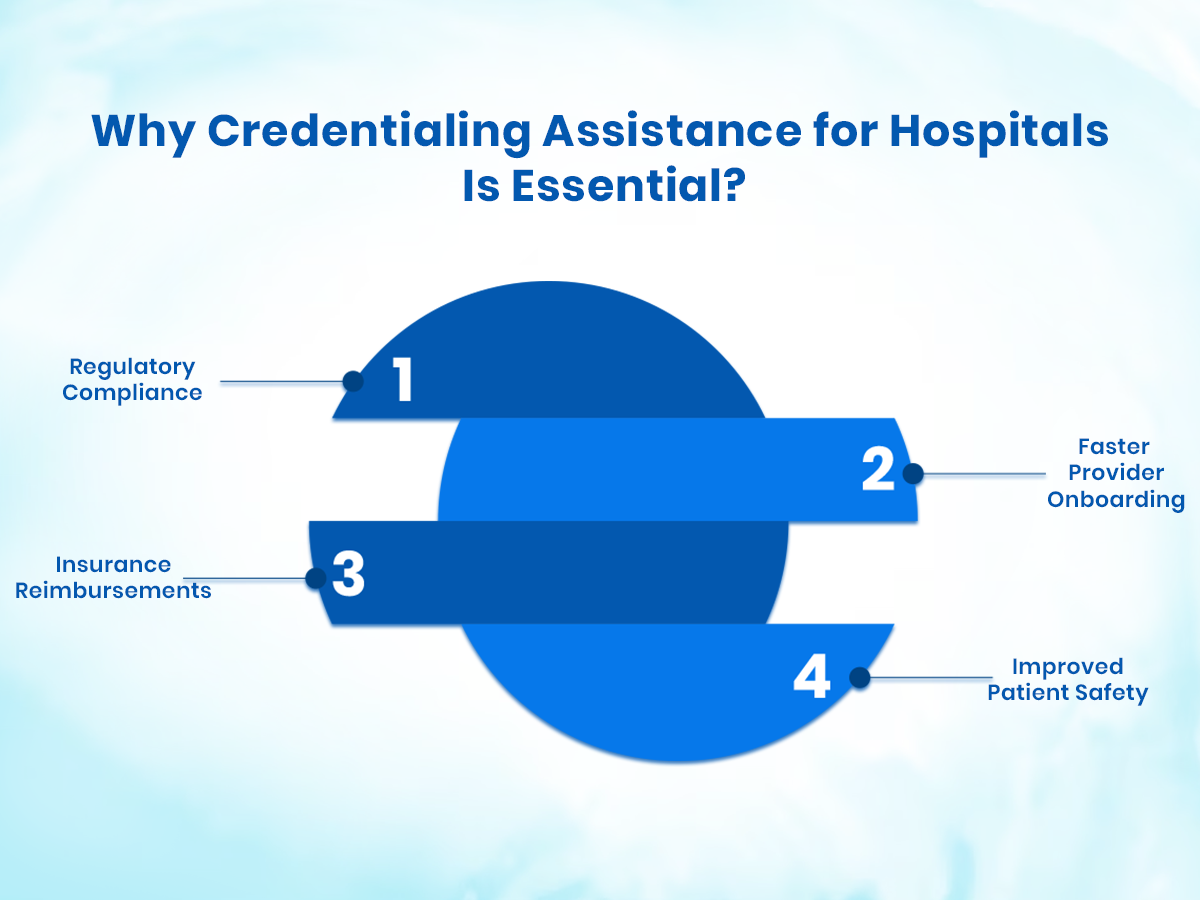Credentialing is a critical component of healthcare management, especially for hospitals. It ensures that healthcare professionals meet all qualifications, licensures, and certifications required to provide safe and quality patient care. However, managing credentialing in-house can be an overwhelming task, given the complexity of the process. This is where credentialing assistance for hospitals comes in as a game-changer, streamlining the process and ensuring compliance with all regulatory requirements.
In this blog, we will delve into the importance of credentialing, the challenges hospitals face, and the benefits of outsourcing credentialing assistance.
What Is Credentialing Assistance for Hospitals?
Credentialing assistance for hospitals involves the management and verification of healthcare providers’ credentials to ensure they meet the qualifications to deliver quality care. It includes collecting, verifying, and maintaining records of medical licenses, certifications, education, and work history. For hospitals, efficient credentialing ensures compliance with accreditation standards and payer requirements, facilitating smoother operations and financial stability.
Why Credentialing Assistance for Hospitals Is Essential
Hospitals face unique challenges in credentialing due to the volume of providers and the complexity of the process. Credentialing assistance for hospitals helps overcome these challenges by offering expertise and automation. Here’s why it matters:

- Regulatory Compliance: Credentialing assistance for hospitals ensures adherence to standards set by The Joint Commission (TJC), National Committee for Quality Assurance (NCQA), and Centers for Medicare & Medicaid Services (CMS).
- Faster Provider Onboarding: Credentialing assistance for hospitals accelerates the onboarding process, reducing delays and allowing providers to start delivering care sooner.
- Insurance Reimbursements: Credentialing assistance for hospitals ensures that providers meet payer requirements, minimizing the risk of claim denials and revenue loss.
- Improved Patient Safety: Proper credentialing guarantees that only qualified professionals deliver care, reducing risks and enhancing trust.
Challenges Addressed by Credentialing Assistance for Hospitals
Credentialing is a complex process, but credentialing assistance for hospitals addresses these key challenges:
- Time-Consuming Processes: Gathering and verifying extensive provider data requires significant time and effort.
- Policy Variations: Credentialing assistance for hospitals navigates the differences in payer requirements and state regulations.
- Incomplete Applications: Credentialing assistance for hospitals ensures that applications are accurate and complete, preventing delays.
- High Provider Volume: Large hospitals benefit from credentialing assistance to manage multiple providers efficiently.
- Continuous Monitoring: Credentialing assistance for hospitals includes tracking expirations of licenses and certifications to maintain ongoing compliance.
Benefits of Credentialing Assistance for Hospitals
Credentialing assistance for hospitals offers numerous advantages, including:
- Efficiency and Accuracy: Credentialing assistance for hospitals streamlines the process, reducing administrative burdens and errors.
- Cost Savings: Credentialing assistance for hospitals minimizes risks of non-compliance and revenue loss due to denied claims.
- Enhanced Provider Satisfaction: Credentialing assistance for hospitals simplifies onboarding, improving provider experience.
- Focus on Care Delivery: By outsourcing credentialing, hospitals can focus on delivering high-quality care to patients.
Choosing the Right Credentialing Assistance Provider
When selecting a credentialing assistance provider, hospitals should consider the following factors:
1. Industry Experience
Choose a provider with a proven track record in healthcare credentialing. Their expertise will ensure smooth and efficient processes.
2. Technology Capabilities
Look for providers that offer advanced credentialing software for automation, tracking, and reporting.
3. Regulatory Knowledge
Ensure the provider is well-versed in healthcare regulations and accreditation requirements.
4. Customer Support
A reliable provider should offer dedicated support to address queries and resolve issues promptly.
5. Customization Options
Credentialing needs vary across hospitals. Select a provider that offers tailored solutions to meet specific requirements.
Conclusion
Credentialing assistance for hospitals is a vital service that ensures providers meet the qualifications to deliver safe and effective care. By streamlining compliance and reducing administrative stress, credentialing assistance for hospitals allows healthcare organizations to prioritize patient care while maintaining financial stability.


